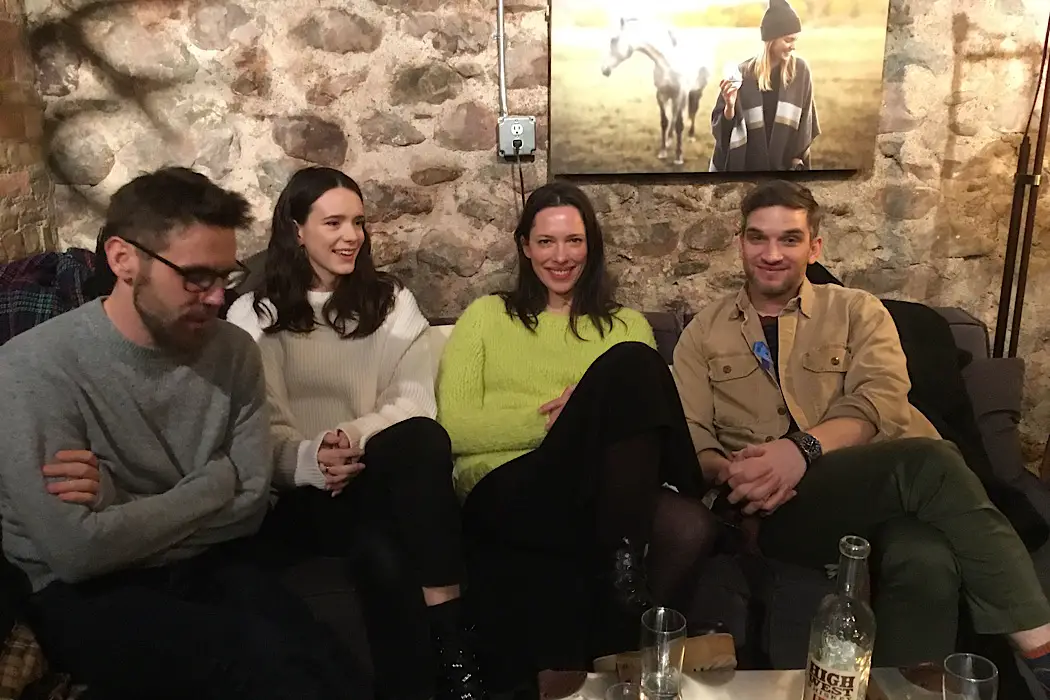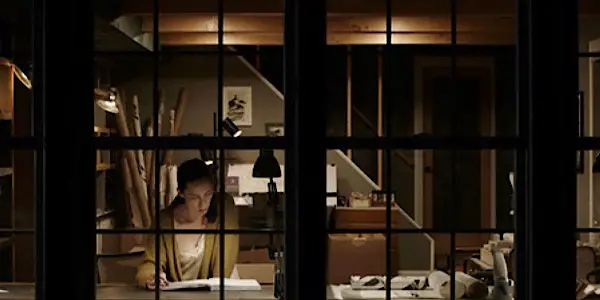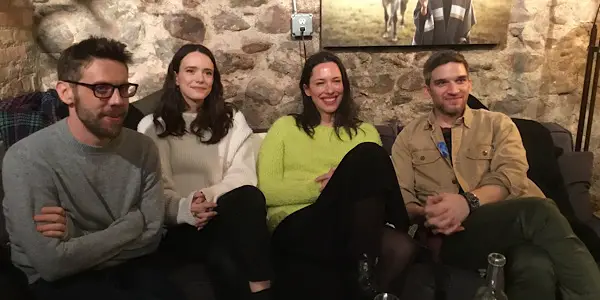Sundance 2020: Round Table Interview With Director & Cast Of THE NIGHT HOUSE

Kristy Strouse is the Owner/Editor in Chief of Film Inquiry,…
Before I was able to catch the film The Night House later that same night, I was able to sit down with a few other critics and the cast, Rebecca Hall, Stacy Martin and Evan Jonigkeit, and director David Bruckner. We were able to chat a lot about the draw for the film, the genre of horror, and their own connections to the story.
David Bruckner isn’t new to horror, but this was a story that stood out to him right away.
“Personally, as a director, there have been few times I read a script that genuinely frightened me. It hit at some things in the more subterranean regions of the narrative that would not leave me alone personally. It followed me home at night and I just couldn’t get it out of my head.
The movie is a bit of a brain teaser, it’s got a mind-bending element to it. Be careful, how much you try to understand it, you may put yourself in peril. That’s a little bit the message of it.”
When asked about how this was different than most horrors, he expanded on what makes The Night House different: “I would say it’s trying to do a lot of new things with old traditional tropes. I think at the center of it is a fascinating central character in this story and this largely follows her singular experience as she investigates the unexpected death of her husband. And she digs a little too deep into who he was and puts herself in peril. I think the movie explores not just grief, but depression and anxiety and what we owe to each other as friends. The complex and influential nuances of a powerful relationship.”
Actress Stacy Martin talked about Bruckner’s response to the script as well, as being a draw. “The way he was talking about the film and what he wanted to achieve and the different levels of grief that he wanted to explore, I thought it was quite fascinating.” All of the actors thought the story stood out.
Actor Evan Jonigkeit added “I thought it was a really cool, strange process to play with an idea of what an entity might be. What that sort of state would be to live in. A fun, weird, cool challenge for me.”
Rebecca Hall talked about her role specifically and cited the character.
“I was drawn to it because I thought the character was really strong and it was really interesting to see a woman in a horror film going through grief and is not sitting in a corner crying the whole time. She has all this rage, and I thought that would be an interesting thing to explore.”

All three of the cast that were present had a different viewpoint on the genre of horror. For Hall, it was, as she said, an interesting relationship: “I think because I don’t really like blood and gore or extreme violence with no particular purpose. I’m very against the idea of a torture porn situation. Which sometimes horror can go into.” She dives deeper into her connection with mentions of why horror can be alluring:
“When I actually think about it, some of my favorite films and the films I respect the most could also be classified as horror. Like, whether it be the Shining or Rosemary’s Baby, all these great films. I think there’s something in the fact that horror films, because of the extreme nature of the subject matter, you’re sort of pushing human experience to the limits, and you are able to explore things that are not so easy or obvious to explore. It’s that crossover, when the themes of a horror film take on a sort of metaphorical significance and aren’t just an exploration of ghosts, but an exploration of grief or whatever, masquerading as an exploration of ghosts. Depression, anxiety masquerading as being haunted, then I think it starts to get really interesting and potentially exciting. So, I’m always drawn to it, despite it not being the genre that I’m a die hard fan for.”
For Evan Jonigkeit, his perspective focuses on a different element of horror: “I also think that there is a thing with horror as a genre that’s really wonderful is a sense of a relief. Like that happened throughout. You get a moment to regroup so you are pushed to that precipice. The good ones have a metaphorical undertone that’s making you expect all these things of yourself, and then you have these moments of relief.
This one in particular, a lot of that is cerebral instead of just trying to fabricate anxiety coming up. It’s a bit of a brain bender, so the cerebral nature of it, it forces you- when I was reading it, to go further, further into it.
And then once something would shift, or we’d be back in a different situation or scenario, you have this immense sense of relief.”
Stacy Martin usually stays away from the genre, but felt that The Night House brought something new: “Something I really enjoyed about this script was at every page I didn’t have that feeling of ‘I don’t think I can cope with this’ because I find horror movies physically quite painful. They affect me so much. With this one it was something totally different and it was talking a lot about grief and also love and the way we expect a loved one to be or ourselves to be loved. I kept having questions and then finding an answer, but then having more questions. Until you really go to the end, you are almost unsatisfied. But in a way that isn’t painful or torturous, it’s almost like a psychology lesson.
It’s the first horror script that I’ve read where I haven’t just, put it down and said “I can’t deal with the way it’s manipulating my feelings, and the characters.”
When a question about the dynamic of the cast came up, Bruckner stated that “It was a very quick shoot. Early on, with our conversations, we realized we were going to be guided by gut, quite a bit throughout.” Though not his usual or preferred method, he went onto elaborate on how this “high wire act” helped: “We were all sort of dropped in the middle of it and getting to know each other and getting to figure out what these moments were, on the fly, with the camera rolling. Again, I think the script provided so many twists and turns, so many ways to interpret it. Not just on a metaphorical level, on how you read it, but even internally in the scenes. There were a lot of dynamics shifts and changes happening beat to beat. For me, it was fantastic to just trust all of them and leap in and just go with the flow and find it as we rolled camera.” He added: “I was discovering a lot in the moment. The script is dense in a way that every time I read it I took away different things. There are many levels of interpretation.”
There was a lot of mentions of the female relationships being the “center” and “heart” of the film, from both Bruckner and the cast.
“One thing we identified and talked about a lot is a lot of the heart of the movie really lived there. It becomes a much more pivotal relationship than maybe the audience expects at a certain point. It’s a movie, at some levels, about help, and what we can offer to one another in states of emotional peril and I think for all the dark places we went to that was something that we hung onto as we maneuvered through it.”
Both Hall and Martin remarked on how crucial these points were to their interest in their roles.

Hall: “The scenes between the women in this film is one of the main things that attracted me to it. There are relationships with other women that are unusual in this kind of genre, frankly. Often, it’s a lady being pursued by terrifying things or men, or their relationship with men. And it was interesting the outlets for this character and the complications are in crucial scenes with other women. I thought that was refreshing and compassionately told. Female friendship is an undermined topic for movies. Still, when it pops up, it’s either overly simplified or a competition.”
Martin said: “what is interesting here – the scenes were so complex, and they became alive and very different when we played them. To be able, as an actor, to sort of read something and have an interest, but then to let them play out – the scene played out rather than an idea, is really fascinating. I think when you are playing something that is being stereotyped or cliched, you want to find something new and compassion as well. Or find ways in which the character might not be the same as you, but you want to find how the character survives in a certain situation. And that’s what this script does in a very human way, even though it pushes boundaries and I think as an actor you are faced with emotions and facts that we aren’t always willing to face, but it’s something you crave when you perform. If I go home in the evening and I’m not exhausted, then that’s a problem. I haven’t run the full mile, there’s something wrong.”
When discussing what they took away from the roles, and what was important to instill in the their characters portrayals, Evan mentioned the importance of the portrayal of grief. “The question of grief and how it plays with the mind is what these two really articulated in a really wonderful way. I watched them [gesturing to the others] work with it and on it, it further deepened my understanding of it, in a way that I thought was really important and cool. Something very rare, especially in a genre film.”
Hall was agreeable, and discussed her own method when it comes to her work ethic and performances: “I second that on some level. It’s important to honor the sense of grief as an emotion and explore what that does to people and try to be true to that, provide something as an actor that people can relate to even if its ghost or whatever. On that level. On a more basic level I think the thing that I want to put into a project or that I bring into it is… I like to be used as an actor. I like to capacity, to be fully utilized. And be able to be like, do as much as I possibly can even if that means taking on something that I’m not sure I can do. And that’s frightening to actually think about, actually using all your capacity as an actor in something, and this demanded me of this a lot of times. Things you want out of it the most is that you bring something useful.”
She mentioned that she often vaguely does roles that are either, “big characterizations or are sort of American versions of myself.” For this film, one of the challenges was the isolation, performing by herself and not being able to play off of other actors. “You realize you get so much from other actors, I love other actors, they’re great.”
Bruckner added that some of his favorite moments were the intimate, quiet ones, of Beth doing small things like packing up a house. He also elaborated on the shoot and location and how it played into the tone: “My movie before this was almost an adventure horror in the Carpathian Mountains, and it was quite expansive, and I was like “I’m just going to make a movie in a house.” [laughs] It’ll be so manageable. But no, it was pretty complex. We found a really great location, a beautiful sort-of cliffside vista for what would be The Night House. The house changes throughout the film in curious ways, so we built a lot of different sections of the house on stage. To add complexity to an already complex narrative I was joking that every time Rebecca walked through a door it was a different day on a different week, a lot of that is played in real time and we were constantly bouncing back and forth from the stage to the real location. It was a bit harrowing in that regard.
You look for imagery that can support the isolation in a lot of ways and in any ways that you can, and to a large degree we hand it to Rebecca, and follow the situation and follow her lead and her experience with the palette that I and the crew have created.”
Hall mentioned Bruckner‘s particular eye. “He has a very particular sensibility of what the audience is going through at every given moment. He’s very attuned to like…’We are going to need to feed them this right at this moment, to have them mystified by that three scenes later.’ I think that kind of eye on how the audience is receiving everything, which is difficult to keep track of when you are shooting, is very particular and unique, and impressive.”
All four were very excited about the premiere coming up that night,
Check out our review here.
We want to thank Evan Jonigkeit, Rebecca Hall, David Bruckner and Stacy Martin for speaking with us.
Does content like this matter to you?
Become a Member and support film journalism. Unlock access to all of Film Inquiry`s great articles. Join a community of like-minded readers who are passionate about cinema - get access to our private members Network, give back to independent filmmakers, and more.
Kristy Strouse is the Owner/Editor in Chief of Film Inquiry, writer, podcaster, and all around film and TV fanatic. She's also VP of Genomic Operations at Katch Data and is a member of The Online Association of Female Film Critics and The Hollywood Creative Alliance. She also has a horror website: Wonderfully Weird & Horrifying.












